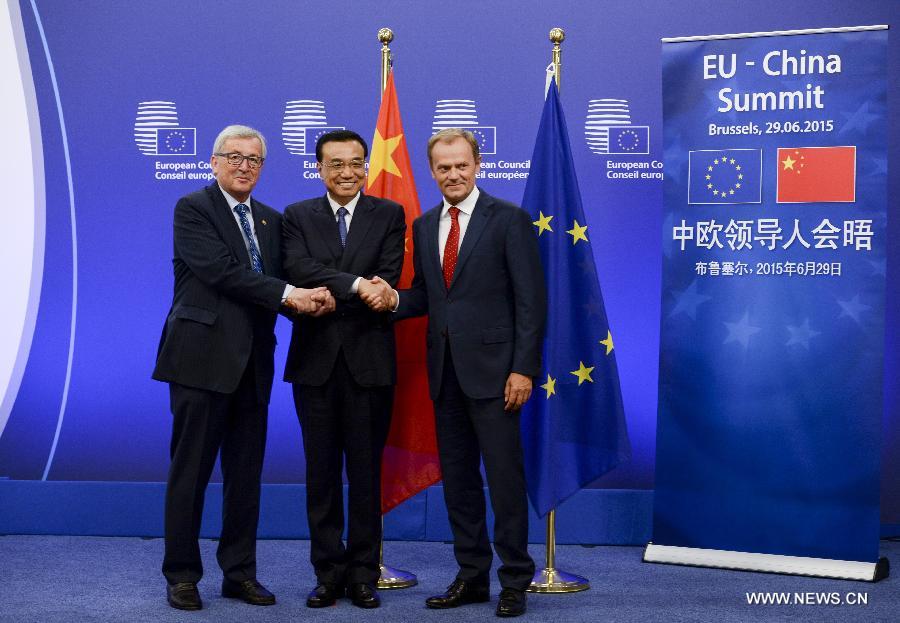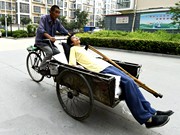

 |
| Chinese Premier Li Keqiang (C) poses for a group photo with President of the European Council Donald Tusk (R) and President of the European Commission Jean-Claude Juncker before the 17th China-EU leaders' meeting in Brussels, Belgium, June 29, 2015. Li co-chaired the meeting with Tusk and Juncker. (Xinhua/Li Xueren) |
BRUSSELS, June 30 -- China and the European Union (EU) on Monday agreed to open a new chapter in bilateral relations after clinching a wide range of deals on climate change, infrastructure investment and people-to-people exchanges.
Visiting Chinese Premier Li Keqiang co-chaired the 17th China-EU leaders' meeting in Brussels with President of the European Council Donald Tusk and President of the European Commission Jean-Claude Juncker, before the two sides issued a joint statement and a statement on climate change.
The two sides also signed several cooperation documents on science and technology, intellectual property, regional policies, and customs.
Since the establishment of the relationship four decades ago, Li said, China and the EU have sustainedly developed their ties, and deepened cooperation at bilateral, regional and international levels.
Li advocated that the two sides join hands to make new breakthroughs and strive for the new chapter of the bilateral relationship.
Li said the two sides should treat each other with strategic visions and from global perspectives, uphold the principles of peaceful development, openness and inclusiveness, win-win cooperation, expand common grounds of mutual interests, and push the bilateral relationship toward new heights.
China and the EU decided to integrate China's "Belt and Road" initiatives with the Investment Plan for Europe and establish a China-EU joint investment fund, he said.
The "Belt and Road" initiatives were proposed by Chinese President Xi Jinping in 2013 with the aim to revive the ancient trade route between Asia and Europe. The Investment Plan for Europe is a 315-billion-euro (352-billion-U.S.-dollar) plan initiated by Juncker to resuscitate European economy.
The two sides agreed to establish an interconnectivity platform and decided to reach a comprehensive investment deal as soon as possible.
They also promised to deepen practical cooperation in the uphill battle against climate change on the basis of their statement on the issue.
The two sides are also planning to draft a roadmap on energy cooperation, while encouraging dialogues and interaction between China and the EU on information and communication technologies.
Regarding people-to-people exchanges, China and the EU will complete negotiations on mutual exemption of visas for diplomat passport holders by 2015 and will discuss how to facilitate visa services for business people, tourists and students.
The Chinese side agreed that the EU could open new visa services centers in 15 more cities in China.
The two sides also agreed to set up a dialogue mechanism concerning legal affairs.
Meanwhile, Li outlined China's proposals on exploring third-party markets through production capacity cooperation and got positive feedback from the EU side.
Both China and the EU agreed to uphold the purposes and principles of the UN Charter, and to help the international order develop in a fairer and more reasonable direction.
Tusk and Juncker agreed on the proposals from the Chinese side on further developing the bilateral relations, saying that China is the EU's interdependent economic partner and political partner addressing global issues.
They said the EU is willing to expand cooperation with China, create jobs and stimulate growth, enhance communication and coordination in the UN and other multilateral mechanisms, as well as closely cooperate with China in issues on climate change, poverty reduction and international peace and security.
The Chinese and EU leaders also exchanged views on the Iranian nuclear issue, the Middle East, Afghanistan and other international and regional issues.
After the Brussels trip, Li traveled to Paris later Monday for an official visit to France.
Day|Week

 Father’s love is like a mountain
Father’s love is like a mountain Walnut too hard for cellphone screen
Walnut too hard for cellphone screen Girls in leaf bikinis perform pole dance on the beach
Girls in leaf bikinis perform pole dance on the beach Fascinating images of Jiuzhaigou Valley
Fascinating images of Jiuzhaigou Valley "Levitating" pole dancer
"Levitating" pole dancer Special armed police attend 'devil trainings' in Hunan
Special armed police attend 'devil trainings' in Hunan Top 10 terrifying tourist sites in China
Top 10 terrifying tourist sites in China Beautiful and smart - post-90s college teacher goes viral
Beautiful and smart - post-90s college teacher goes viral